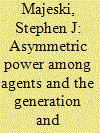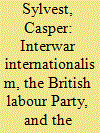|
|
|
Sort Order |
|
|
|
Items / Page
|
|
|
|
|
|
|
| Srl | Item |
| 1 |
ID:
052407


|
|
|
|
|
| Publication |
June 2004.
|
| Summary/Abstract |
The question addressed in this analysis is whether endowing agents with various forms of asymmetric power makes cooperation more likely across a variety of structural settings of conflict and cooperation present in international relations. To address this question, an agent-based model incorporating asymmetric power among agents in a set of (2 2) games that represent different forms of conflict and cooperation prevalent in international relations (Chicken, Stag, Assurance, Deadlock, and Prisoner's Dilemma) is developed and analyzed via simulation. Simulation results indicate that the introduction of asymmetric power substantially increases the chances that both cooperative agents survive and cooperative worlds evolve. This is particularly the case when agents are endowed with the ability to selectively interact with other agents. Also, anticipated variations in outcomes across the game structures regarding the likelihood of cooperation are supported.
|
|
|
|
|
|
|
|
|
|
|
|
|
|
|
|
| 2 |
ID:
052405


|
|
|
|
|
| Publication |
June 2004.
|
| Summary/Abstract |
This article questions two interrelated myths pertaining to the interwar internationalism of the British Labour Party and the theories of so-called idealists in the academic discipline of International Relations (IR). In IR, interwar "idealists" are (in)famous for a detached and utopian approach to international politics. Conventional historiographical verdicts on the international policy of the Labour Party in the interwar period suggest that the party was the practical mirror of this naïve international outlook. In fact, the two themes are connected, most notably through Labour's Advisory Committee on International Questions. This article brings the study of Labour's internationalism and the international theories of purported idealists together by focusing on debates on the League of Nations and the use of force. The analysis reveals that conventional historiographical narratives are inadequate and too simplistic for grasping the diversity of Labour's internationalism and interwar progressivist ideas about international politics in general.
|
|
|
|
|
|
|
|
|
|
|
|
|
|
|
|
| 3 |
ID:
052406


|
|
|
|
|
| Publication |
June 2004.
|
| Summary/Abstract |
Over the postwar period, states have shifted from cooperation in support of monetary guidelines, or standards for variation in wages, prices, and exchange rates, to the use of austerity as the primary means of maintaining monetary stability. In this article I offer a constructivist theory of international monetary relations in order to explain this shift, contrasting the effects of Keynesian and Neoclassical understandings on interests in cooperation. I argue that postwar Keynesian understandings, which cast monetary power as based in the authority to stabilize expectations, led states to perceive common interests in maintaining decentralized-but-legitimate guidelines. I then argue that more recent Neoclassical views, which cast monetary power as a function of capabilities, have justified reduced mutual assistance and greater recourse to austerity. From this vantage point, Neoclassical understandings, rather than any material constraints, impede the cooperation necessary to reconcile the impossible trinity of capital mobility, full employment, and monetary stability.
|
|
|
|
|
|
|
|
|
|
|
|
|
|
|
|
| 4 |
ID:
052408


|
|
|
|
|
| Publication |
June 2004.
|
| Summary/Abstract |
The past decade has witnessed a growing interest among scholars of international relations, and global environmental governance in particular, in the role of transnational networks within the international arena. While the existence and potential significance of such networks has been documented, many questions concerning the nature of governance conducted by such networks and their impact remain. We contribute to these debates by examining how such networks are created and maintained and the extent to which they can foster policy learning and change. We focus on the Cities for Climate Protection (CCP) program, a network of some 550 local governments concerned with promoting local initiatives for the mitigation of climate change. It is frequently asserted that the importance of such networks lies in their ability to exchange knowledge and information, and to forge norms about the nature and terms of particular issues. However, we find that those local governments most effectively engaged with the network are mobilized more by the financial and political resources it offers, and the legitimacy conferred to particular norms about climate protection, than by access to information. Moreover, processes of policy learning within the CCP program take place in discursive struggles as different actors seek legitimacy for their interpretations of what local climate protection policies should mean. In conclusion, we reflect upon the implications of these findings for understanding the role of transnational networks in global environmental governance.
|
|
|
|
|
|
|
|
|
|
|
|
|
|
|
|
|
|
|
|
|